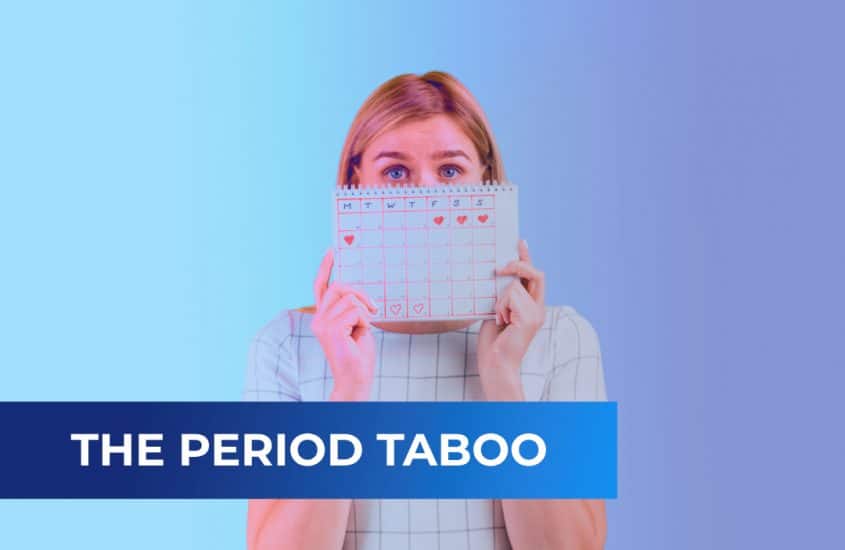The Period Taboo

Author: Manisha Mathews
I still get my sanitary napkins packed in a black polythene bag or a brown paper bag from the chemist. Not because I want it that way but because it is an unwritten code, the proper thing to do. Menstruation is still a big taboo in our country. I have always found it funny that women in their workplaces have to hide sanitary napkins in their pockets or carry their bags to the washroom when they need to change for fear of male colleagues knowing about it. Male colleagues have several women in their house, be it the mothers or their sisters or daughters.
Seven Years of Bleeding
This stigma around menstruation does more damage than one can imagine. Picture an average woman who menstruates for about seven years of her lifetime. This is also the period when she is not allowed to go to religious places, not allowed in the kitchen (in some cultures), not allowed to swim, not allowed to play sports (or is incapable of doing so because of the pain and discomfort) and so forth. Imagine not being allowed to do several things that you would like for seven years and, to top it, having to make excuses on why you cannot do it since you cannot tell anyone that you are menstruating.
While privileged women may face some of the above-mentioned difficulties, people from underrepresented groups and women with disabilities go through a lot more. Access to sanitary pads and clean water is not a luxury they can afford. Women with disabilities are doubly impacted. Almost every school-going girl has had an episode where she feels embarrassed for staining her clothes. There is another group of women for whom these seven years are excruciatingly painful. They suffer from what is called Dysmenorrhea or menstrual pain. It causes not just agonizing pain but a total inability to do anything they would do on a normal day. Women who suffer from severe dysmenorrhea experience nausea, vomiting, diarrhoea, headaches, and muscle cramps. A study reported twelve per cent of adolescent girls and young women aged 14–20 years are absent from school or work each month because of dysmenorrhea [1]. Endometriosis, the leading cause of dysmenorrhea, is prevalent in 10% of women globally, says WHO [2]. Endometriosis is a monster whose cause is unknown. Medical science has no known way to prevent it. Yet, it is not talked about as much as it should be.
The Role of Civil Society
What can we do to normalise this basic function of the female body and show some much required empathy to the women who suffer adversely from it? First and foremost, we should be able to talk about it in the open. I don’t mean that women should go about announcing to everyone that they are menstruating. Not at all. But they shouldn’t need to hide their sanitary napkins, and they don’t need to feel guilty for not putting in their best at work or school. They should get the much needed care and support they need.
While mothers start preparing their young daughters for menstruation, they also need to educate their sons on being supportive of the opposite gender. Education to both genders about premenstrual syndrome (PMS) is essential. Building sensitivity not just about menstruation but also about PMS and its signs and symptoms is essential.
Conversations about the pain being experienced by adolescent girls are essential to gauge if treatment is needed. When the cause of dysmenorrhea is diagnosed early on, it can save women from going through a lot of pain and agony. Young girls should feel confident to talk about their discomfort and seek help if needed. They also need to be told that the mood swings, anxiety, etc., they experience are not imagined but real. They need the tools to manage these symptoms and the support and care of their families, educational institutions and organizations.
As a civil society, we also need to be more informed about menstruation and how it affects different women differently. Everyone doesn’t go through the same lived experience. If you don’t have painful periods or don’t know anyone who does, tipping the balance with your views on critical issues such as menstrual leave to the detriment of scores of women who need it is something we should be cognizant of. Awareness is key to contributing meaningfully to any debate.
The Role of Organizations / Educational Institutions
Organizations and educational institutions can play an important role in sensitization and eradicating the stigma around menstruation. Several organizations place sanitary pads in the washrooms for women employees to use. It is a basic necessity like putting toilet paper in the washrooms. Organizations can show they care by organizing free menstrual health check-ups for women or providing an allowance for the same. Educational institutions can help by doing what they do best—educating and sensitizing both genders about women’s menstrual life stages and related issues.
When civil society, educational institutions and employers, along with the Government come together to destigmatise this taboo, women will feel supported and strengthened to become their best versions.
Works Cited
[1] Committee on Adolescent Health Care, “Dysmenorrhea and Endometriosis in the Adolescent,” December 2018. [Online]. Available: https://www.acog.org/clinical/clinical-guidance/committee-opinion/articles/2018/12/dysmenorrhea-and-endometriosis-in-the-adolescent. [Accessed 26 May 2023].
[2] World Health Organization, “Endometriosis,” World Health Organization, 24 March 2023. [Online]. Available: https://www.who.int/news-room/fact-sheets/detail/endometriosis. [Accessed 26 May 2023].
*The author has close to two decades of experience working with multinational publishers such as SAGE India and Oxford University Press India. In her many roles as a children’s book author, publishing consultant and researcher, she continually seeks new opportunities for research and content creation.*









